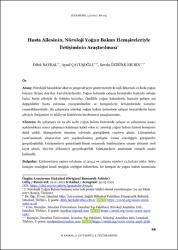| dc.contributor.author | Baykal, Dilek | |
| dc.contributor.author | Çavuşoğlu, Aysel | |
| dc.contributor.author | Öztürk Erden, Sevda | |
| dc.date.accessioned | 2021-05-02T16:52:15Z | |
| dc.date.available | 2021-05-02T16:52:15Z | |
| dc.date.issued | 2021 | en_US |
| dc.identifier.issn | 2536-4499 | |
| dc.identifier.issn | 2602-2605 | |
| dc.identifier.uri | https://hdl.handle.net/11363/2730 | |
| dc.description.abstract | Amaç: Nörolojik hastalıklar akut ve progresif seyir göstermesiyle kronik dönemde en fazla yoğun bakıma ihtiyaç duyulan hastalıklardandır. Yoğun bakımda çalışan hemşireler hastayla olduğu kadar hasta ailesiyle de iletişim kurarlar. Özellikle yoğun bakımlarda hastada gelişen ani değişiklikler hasta yakınına yansıyabilmekte ve hemşirelerle iletişimlerinde sorunlar yaşanabilmektedir. Bu çalışmada nöroloji yoğun bakım ünitesinde çalışan hemşirelerin hasta ailesiyle iletişimleri ve etkileyen faktörlerin incelenmesi amaçlanmıştır.
Yöntem: Bu çalışmaya en az altı aydır yoğun bakım ünitesinde çalışan ve çalışmanın amacı açıklandıktan sonra çalışmaya katılmayı kabul eden 10 nöroloji yoğun bakım ünitesi hemşiresi dâhil edildi. Hemşirelerle önceden telefonla görüşülerek randevu alındı. Literatürden yararlanılarak oluşturulan yarı yapılandırılmış görüşme formu aracılığıyla görüşmeler gerçekleştirildi. Görüşmelerin gerçekleştirilmesi esnasında katılımcıların onamı alınarak sesli kayıt alındı, bire-bir dökümleri gerçekleştirildi. Görüşmelerin analizinde tematik analiz kullanıldı.
Bulgular: Katılımcıların yaşları ortalama 37,3±4,5 ve çalışma süreleri 13,6±8,92 yıldır. Sekiz hemşire mesleğini kendi isteğiyle seçtiğini belirtirken, bir hemşire de yoğun bakım ünitesinde çalışmayı kendisinin tercih ettiğini belirtti. Katılımcıların hasta yakınlarıyla iletişim problemi yaşadıklarında günlük yaşamlarının ve özel hayatlarının olumsuz etkilendiği anlaşıldı. Ayrıca katılımcılar hasta yakınlarının kendilerine davranışlarını “saygısızca” ve “empati yoksunu” olarak tanımladılar. Son olarak yoğun bakım ve hastane koşullarının da hasta yakınlarıyla iletişim problemi yaşamalarına katkıda bulunduğu anlaşılmaktadır.
Sonuç: Genel olarak hemşirelerin hasta yakınlarının iletişim kurma şeklinden hoşnut olmadığı, hasta yakınlarının olumsuz davranışlarının iş motivasyonlarını azalttığı ve hasta yakınlarından saygı bekledikleri anlaşıldı. Hemşirelerin gözüyle hasta yakınlarının iletişim kurma biçimlerinin anlaşılması toplum sağlığına önemli katkı sağlayan hemşirelerin yaşadıklarına bakış sağlayacaktır. | en_US |
| dc.description.abstract | Aim: Neurological diseases are among the diseases that require the most intensive care in the chronic period, with an acute and chronic period. Nurses working in the intensive care unit communicate with the patient as well as their family. Sudden changes in the patient, especially in intensive care units, can be reflected in the relatives of the patient and problems may occur in communication with nurses. This study aimed to examine the communication of nurses working in the neurology intensive care unit with the patient family and the influencing factors.
Methods: Ten neurology intensive care unit nurses, who had been working in the intensive care unit for at least 6 months and agreed to participate in the study after the purpose of the study was explained, were included in this study. An appointment was made by talking to the nurses beforehand. Interviews were carried out through a semi-structured interview form created using the literature. During the interviews, the consent of the participants was obtained and audio recording was made, and verbatim transcriptions were made. Thematic analysis was used in the analysis of the interviews.
Results: Participants mean age 37,3±4,5 and duration of work 13,6±8,92 years. Eight nurses stated that they chose their profession voluntarily, and one nurse stated that they preferred to work in the intensive care unit. It was understood that when the participants had communication problems with their relatives, their daily and private lives were negatively affected. In addition, the participants described the behaviours of the relatives of the patients towards themselves as “disrespectful” and “lack of empathy”. Finally, it is understood that the intensive care and hospital conditions also contribute to the communication problems with the relatives of the patients.
Conclusions: In general, it was understood that nurses were not satisfied with the way patients’ family communicated, negative behaviors of patients’ family reduced their work motivation and they expected respect from their relatives. Understanding the communication styles of patients’ family through the eyes of nurses will provide an insight into the experiences of nurses who make an important contribution to public health. | en_US |
| dc.language.iso | tur | en_US |
| dc.publisher | İstanbul Gelişim Üniversitesi Yayınları / Istanbul Gelisim University Press | en_US |
| dc.relation.isversionof | https://doi.org/10.38079/igusabder.870481 | en_US |
| dc.rights | info:eu-repo/semantics/openAccess | en_US |
| dc.rights | Attribution-NonCommercial-NoDerivs 3.0 United States | * |
| dc.rights.uri | http://creativecommons.org/licenses/by-nc-nd/3.0/us/ | * |
| dc.subject | Nöroloji yoğun bakım | en_US |
| dc.subject | hemşire | en_US |
| dc.subject | iletişim | en_US |
| dc.subject | hasta ailesi | en_US |
| dc.subject | Neurology intensive care | en_US |
| dc.subject | nurse | en_US |
| dc.subject | communication | en_US |
| dc.subject | patient family | en_US |
| dc.title | Hasta Ailesinin, Nöroloji Yoğun Bakım Hemşireleriyle İletişiminin Araştırılması | en_US |
| dc.title.alternative | Examination of Patient Family’ Communication with Neurology Intensive Care Nurses | en_US |
| dc.type | article | en_US |
| dc.relation.ispartof | İstanbul Gelişim Üniversitesi Sağlık Bilimleri Dergisi | en_US |
| dc.department | İstanbul Gelişim Üniversitesi | en_US |
| dc.authorid | https://orcid.org/0000-0001-5965-9318 | en_US |
| dc.authorid | https://orcid.org/0000-0003-3471-1487 | en_US |
| dc.authorid | https://orcid.org/0000-0003-4256-3736 | en_US |
| dc.identifier.issue | 13 | en_US |
| dc.identifier.startpage | 88 | en_US |
| dc.identifier.endpage | 105 | en_US |
| dc.relation.publicationcategory | Makale - Ulusal Hakemli Dergi - Kurum Öğretim Elemanı | en_US |



















